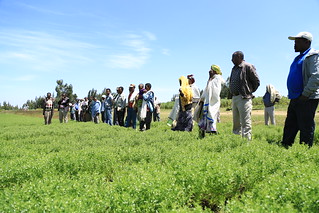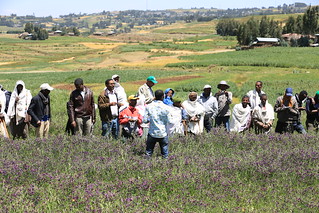End of season field days in Ethiopia zoom in on promising interventions

The Africa RISING project in Ethiopia has been organizing field days since 2013 for a range of participants at its 4 sites and 8 research kebeles.
The mid-season, end season and larger field days aim to demonstrate on-farm research interventions and get feedback from participating and non-participating farmers and other local and CGIAR partners. The field days also help identify technologies and management practices that suit farmers’ needs under local environmental conditions.
Field days have proved to be a strong mechanism for cross-project learning as they have engaged farmers, extension, NGOs, universities, market dealers, industries and other value chain actors across the whole project stakeholder spectrum.
The project organized field days in all of its research kebeles in the last quarter of 2015.
In Lemo woreda a three day field day was organized in October. The visits mobilized 116 people (23 women). The major research activities visited were participatory crop variety selection activities (chickpea and wheat), community based decentralized seed multiplication activities, seed potato storage technology, yield gap analysis trails, Enset research demonstrations, avocado fields, irrigation technology demonstrations (solar and rope and washer pumps, rain water harvesting ponds), micro water shade management activities, sweet lupin adaptation trials, oat and vetch and tree lucerne research activities. Read a photo report.

Similarly, the Basona Worena site organized field days in October. The focus was on mechanized seeding; bread wheat community seed multiplication; integrated disease management of faba bean gall; field pea, lentil, and durum wheat participatory variety selection (PVS); oat and vetch fodder production; tree lucerne; wheat yield-gap trials and the watershed initiative; crop residue management (shade and feed troughs); food barley seed multiplication and field pea PVS. Endale Lemma (Head of the woreda Office of Agriculture) said that most of the research activities implemented this year can be used as learning/model sites for extension and he plans to organize further field days to scsle these out more widely. Read a photo report.
In Endamehoni, the field day for higher officials and policymakers was also in October. Particiapants saw faba bean seed and potato multiplication, lupin adaptation trials, oat-vetch demonstration and tree lucerne plots in Emba Hasti kebele. They saw wheat seed multiplication, durum wheat, field pea and lentil PVS trials in Tsibet kebele. They very much appreciated the food crops and feed related interventions and their performance. They also appreciated the different technology options introduced by the project. The head of the regional bureau of agriculture said that ‘’without suitable and high yielding technology options, it will be impossible to feed the increasing population with small and fragmented land thus the technology options that the Africa RISING project introduced have vital roles to help farmers increase their production from the their small plot of land.” Read a photo report.
In December, Sinana woreda also organized a productive farmer’s field day in Salka and Ilu-Sanbitu kebeles. More than 80 participants attended from the zonal administration and office of agriculture, Sinana agricultural research center, Medawolabu University, local NGOs, CGIAR centres as well as the woreda administration and offices of agriculture, livestock, irrigation and cooperatives.
Participants visited PVS (durum wheat, lentil, field pea and chickpea) trials; faba bean post-harvest management; raised bed trials; small mechanized seeding of wheat; CSP (potato, food barley, faba bean and wheat); tree lucerne and oat vetch trials, the high-value fruit tree nursery site, apple and tree lucerne on-farm demonstration trials and improved potato seed storage structure (DLS). Discussions were held on mono-cropping problems and joint efforts of all stakeholders to break it down, conducting cost-benefit analyses of best technologies before scaling, and the future roles of partners and innovation platforms in identifying technologies for scaling.
The representative of the zonal administration appreciated the action research approach. He pointed out that scaling up of best technologies will led by local stakeholders and he asked that project leaders continue considering the local context, prioritizing problems, focusing on proven technologies and sharing the results on time. Read a photo report.




